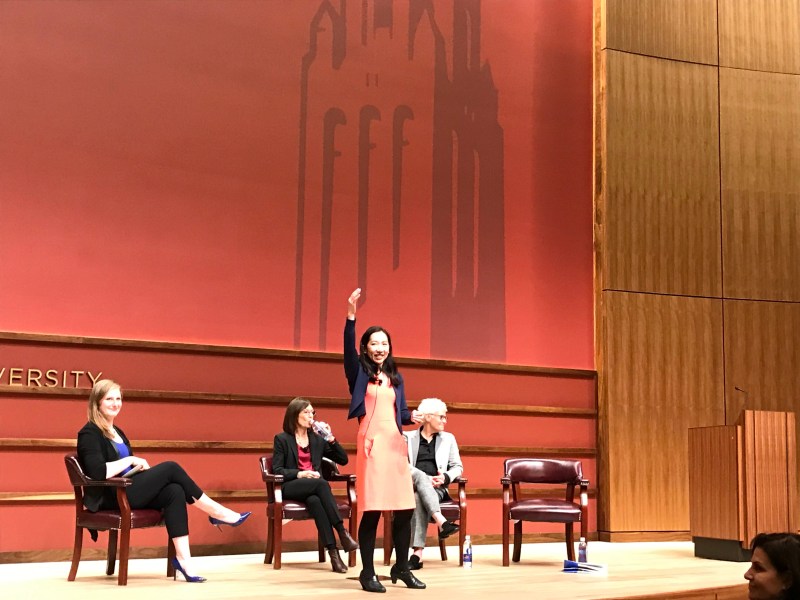Planned Parenthood president Leana Wen, the first physician in nearly 50 years to lead the organization, spoke about the realities of gender disparities in public health in a panel discussion on Tuesday.
“When you keep people unhealthy, it’s a tool of oppression,” Wen said. “And along those lines, I believe that stigmatizing women’s health is a tool of misogyny.”
The event, hosted by the Stanford Womxn’s Coalition in conjunction with the Stanford Planned Parenthood Generation Action Chapter, hosted two other experts in conversation with Wen: Beth Roemer of Kaiser Permanente and Leslee Subak of Stanford Health Care.
Wen, who served as the Baltimore City Health Commissioner prior to joining Planned Parenthood in November 2018, called reproductive healthcare rights “a guaranteed human right.”
“We should not be siloing out and stigmatizing women’s healthcare, reproductive healthcare and seeing it as something other than what it is, which is healthcare,” Wen said.
The panel named issues in reproductive healthcare — specifically, rising maternal mortality — as examples of a significant disparity affecting women in public health. Maternal mortality has risen from seven deaths per 100,000 live births in 1987 to 26 deaths per 100,000 live births today, Roemer said.
“I think that pregnant women are a canary in a coal mine,” Wen said. “Pregnant women are dying and postpartum women are dying because of health problems that they had that were undiagnosed and untreated. Overall, the maternal mortality rate is a broader reflection of the lack of attention to women’s health.”
Wen, drawing on her time as the Baltimore Health Commissioner, also noted that women’s health intersected with other demographic factors. Through analysis of different health outcomes in different areas of the city, she noticed that disparities in Baltimore often follow the boundaries of segregated neighborhoods.
“The life expectancy map is shockingly — not shockingly for those of us in public health — the same map of infant mortality, gun violence, drug abuse, overdose rates, really anything that you can think of … because that map was the social determinants of [the] health map,” Wen said.
“The populations that have amplified disparities … are worsened because of the policies that we have that compound structural racism and inequity,” she added.
For Wen, her journey to Planned Parenthood was personal. As a medical student at Washington University in St. Louis, Wen recalled living across the street from a Planned Parenthood location. During her time, she witnessed the difference between public perception of the hospital where she went on rotations and the Planned Parenthood that provided reproductive health services and education to women.
“I would see protestors, just people holding up signs, shouting at patients, shaming women, trying to do everything they can to prevent clinicians from delivering care and patients from getting the same care that they were getting just a few blocks away,” she recalled.
However, she never foresaw herself becoming a “public health leader.”
“How it happened is that I became an emergency physician,” Wen said. “And working in the emergency department, I saw just why the work that we did there is incomplete.”
Working in the emergency room, Wen regularly treated a boy for asthma who was often homeless or lived with a regular smoker. Another patient was a woman who had a stroke because she had to cut her blood pressure pills in half and couldn’t afford insulin. Wen was struck by her inability to mitigate their extenuating circumstances, and both experiences eventually pushed her towards public health work.
“What was my duty as a doctor?” she asked. “Yes, it was to treat the illness of why she was there that day, but how is that going to be preventing even more people from having the same outcome as her? What was my obligation also to be advocating for my patients on a broader level too?”
At the end of the night, Wen and Roemer told their audience that their hope for the future lies in students, as current and future policy-makers, community organizers, patient advocates and more.
“Getting basic health care should not be political,” she said “But if that’s what it is, then we have an obligation to fight back as well. Because again, if we’re not the ones fighting back, then who is going to on behalf of our patients?”
This article was corrected to reflect that the Stanford Womxn’s Coalition was the primary sponsor of this event, hosting it in conjunction with the Stanford Planned Parenthood Generation Action Chapter. The Daily regrets this error.
Contact Emma Hard at emmahard ‘at’ stanford.edu and Leah Eliza Balter at leahbalter09 ‘at’ stanford.edu.
